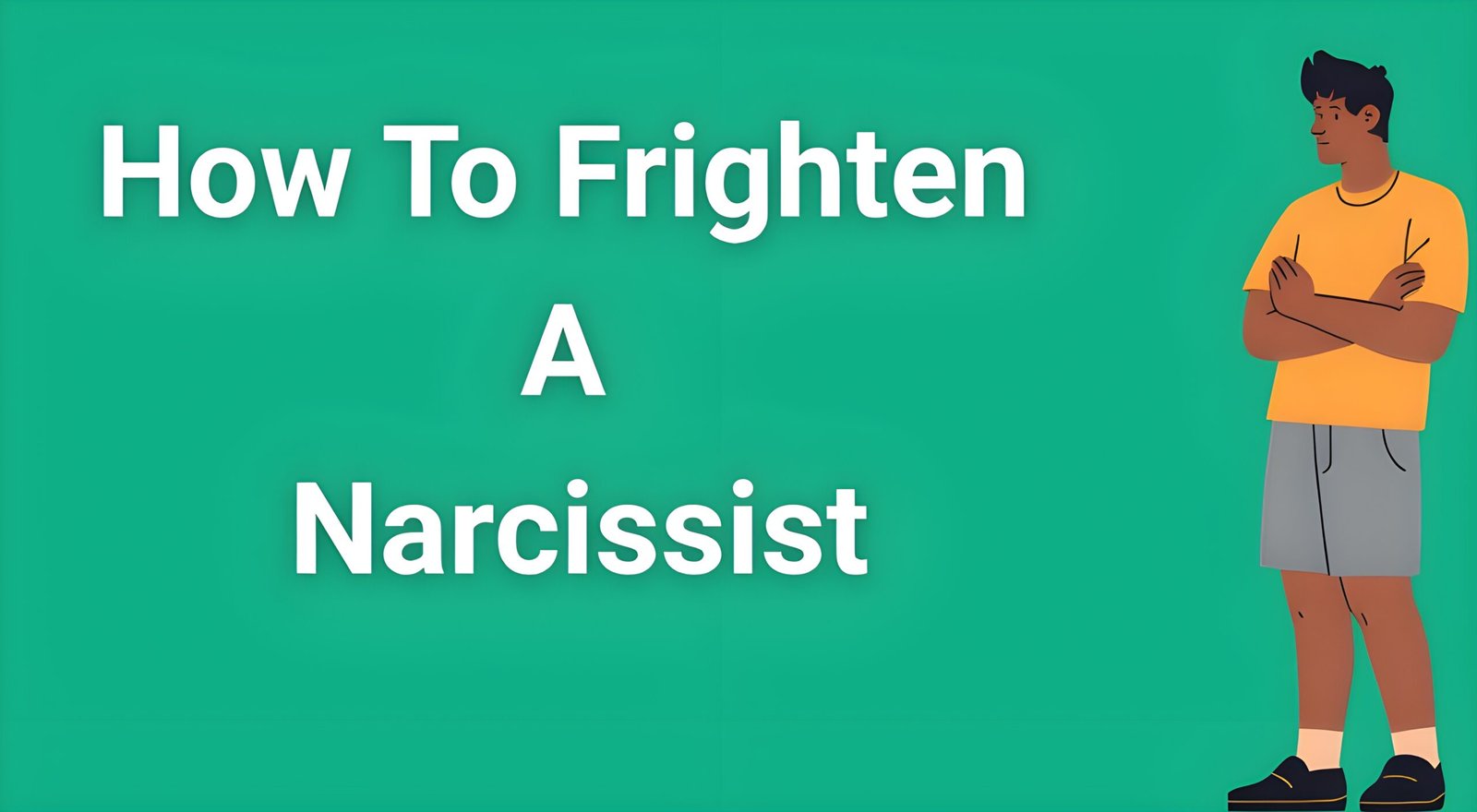If you’ve been wondering how to frighten a narcissist who’s been manipulating and controlling you, you’re not alone. Thousands of people search for ways to make narcissists back down, respect boundaries, and stop their toxic behavior. The truth is, understanding what narcissists genuinely fear can be your most powerful tool for protection and recovery.
- Understanding the Narcissistic Mind: Why They Can Be “Frightened”
- What Narcissists Fear Most: The Psychology Behind Their Vulnerabilities
- 12 Powerful Ways How to Frighten a Narcissist
- The Science Behind Narcissistic Fear
- When Learning How to Frighten a Narcissist Becomes Necessary
- Recognizing Your Own Growth
- Professional Support for Your Journey
- Breaking Free from Trauma Bonds
- Protecting Yourself During the Process
- Long-term Recovery and Prevention
- Frequently Asked Questions
- Conclusion
Unlike what you might expect, learning how to frighten a narcissist isn’t about becoming cruel or manipulative yourself. Instead, it’s about understanding their psychological vulnerabilities and becoming someone they simply cannot control. When you know what truly terrifies them, you can protect yourself and potentially help them respect your boundaries.
Understanding the Narcissistic Mind: Why They Can Be “Frightened”
Before exploring how to frighten a narcissist, it’s essential to understand what drives their behavior. Narcissists operate from a place of deep shame and insecurity, despite their outward appearance of confidence and superiority. Their entire persona is built on maintaining control, receiving constant validation, and avoiding exposure of their true, vulnerable self.
Research shows that narcissistic individuals have an overwhelming fear of abandonment, rejection, and exposure. These fears drive most of their manipulative behaviors. When you understand this psychology, you realize that narcissists aren’t actually the powerful figures they pretend to be—they’re deeply afraid individuals who use aggression and manipulation to hide their vulnerabilities.
This knowledge becomes your advantage when learning how to frighten a narcissist in healthy, protective ways.
What Narcissists Fear Most: The Psychology Behind Their Vulnerabilities
Understanding how to frighten a narcissist begins with recognizing their core fears. These aren’t surface-level concerns but deep psychological terrors that drive their behavior patterns:
Fear of Exposure: Narcissists live in constant fear that others will see through their carefully constructed facade. They’re terrified of anyone discovering their true self—the scared, ashamed person hiding behind the grandiose exterior.
Fear of Abandonment: Despite appearing fiercely independent, narcissists are terrified of being left alone. They fear losing their sources of validation and control, which they need to maintain their false self-image.
Fear of Accountability: Being held responsible for their actions is one of the most frightening experiences for a narcissist. They’ve built their entire identity around being right, superior, and blameless.
Fear of Irrelevance: Narcissists need constant attention and admiration. The thought of being ignored or becoming unimportant to others creates profound terror for them.
These fears form the foundation for understanding how to frighten a narcissist in ways that protect you and potentially encourage healthier behavior from them.
12 Powerful Ways How to Frighten a Narcissist
1. Become Emotionally Independent
One of the most effective ways to learn how to frighten a narcissist is to develop emotional independence. Narcissists rely on your emotional reactions to maintain control. When you stop seeking their validation and approval, you remove their primary source of power over you.
Practice self-validation techniques, build confidence through affirmations, and cultivate relationships with supportive people outside the narcissistic dynamic. When you no longer need their approval to feel good about yourself, you become truly frightening to them because they lose their ability to manipulate your emotions.
2. Set Unshakeable Boundaries
Learning how to frighten a narcissist often starts with establishing firm boundaries. Narcissists test boundaries constantly, expecting you to eventually give in. When you maintain consistent, non-negotiable boundaries, you create an environment they cannot control.
Start with small boundaries and gradually expand them. Be clear about consequences and follow through every time. The consistency of your boundary enforcement will eventually make them afraid to test you because they’ll know you mean business.
3. Stop Providing Narcissistic Supply
Understanding how to frighten a narcissist includes cutting off their “narcissistic supply”—the attention, validation, and emotional reactions they crave. This supply is like oxygen to them, and withdrawing it creates genuine fear.
Stop reacting to their provocations, don’t offer unsolicited compliments or attention, and avoid getting drawn into their drama. When you become an unreliable source of supply, they begin to fear losing you entirely.
4. Hold Them Accountable
One of the most frightening experiences for a narcissist is being held accountable for their actions. They’re used to deflecting blame and escaping consequences through manipulation and gaslighting.
When learning how to frighten a narcissist, document their behavior, ask direct questions about their actions, and refuse to accept their deflections. Insist on clear answers and don’t let them change the subject when discussing their problematic behavior.
5. Expose Their Contradictions
Narcissists often contradict themselves because they say whatever serves their interests in the moment. Pointing out these contradictions is an effective way to frighten them because it challenges their carefully maintained image of being always right and superior.
Keep track of their statements and calmly point out inconsistencies. This technique works particularly well in group settings where others can witness the contradictions, making it even more frightening for the narcissist.
6. Build a Strong Support Network
Isolation is a narcissist’s best friend, but a strong support network is their worst nightmare. When learning how to frighten a narcissist, surrounding yourself with people who understand your situation and support your well-being creates a powerful deterrent.
Narcissists fear support networks because they make manipulation more difficult and provide witnesses to their behavior. They also fear that you might share details about their true nature with others, potentially damaging their reputation.
7. Develop Unshakeable Self-Worth
Perhaps the most frightening thing to a narcissist is someone with genuine, unshakeable self-worth. When you truly know your value and don’t derive it from external sources, you become nearly impossible to manipulate.
Invest in personal growth, therapy, or coaching. Understand your strengths and accept your imperfections. When you radiate genuine confidence rather than seeking validation, narcissists find you both attractive and terrifying because they can’t control you.
8. Use the Gray Rock Method
The Gray Rock Method is a powerful technique for those learning how to frighten a narcissist. This involves becoming as boring and uninteresting as possible during interactions, providing minimal responses and showing no emotional reactions.
When you consistently respond with neutral, unengaging communication, you remove the entertainment value narcissists seek from interactions. This makes them fear that you’re becoming disinterested in them entirely.
9. Question Their Authority
Narcissists position themselves as experts on everything and expect others to accept their opinions without question. Learning how to frighten a narcissist includes respectfully questioning their statements and asking for evidence to support their claims.
Use phrases like “How do you know that?” or “Can you show me where you found that information?” This technique frightens them because it challenges their false sense of superiority and expertise.
10. Maintain Your Own Reality
Gaslighting is a narcissist’s favorite manipulation tool, but when you maintain your own sense of reality, it becomes ineffective. Keep a journal of events, trust your memories, and don’t let them convince you that your perceptions are wrong.
When learning how to frighten a narcissist, remember that your unwavering grip on reality threatens their ability to manipulate and control you. They fear people who cannot be gaslit because such people cannot be controlled.
11. Practice Selective Attention
Give attention strategically rather than automatically. Narcissists expect immediate attention whenever they demand it, so learning how to frighten a narcissist involves controlling when and how you engage with them.
Respond to reasonable requests but ignore attention-seeking behaviors. This unpredictability in your attention creates fear because they can’t control when they’ll receive the validation they crave.
12. Plan Your Exit Strategy
Perhaps nothing frightens a narcissist more than the genuine possibility of losing you entirely. Having a clear exit strategy—whether from a relationship, workplace, or living situation—gives you power and creates fear in them.
Even if you’re not ready to leave immediately, having a plan reduces their control over you and increases their fear of abandonment. This fear often motivates temporary improvements in their behavior as they sense the real possibility of consequences.
The Science Behind Narcissistic Fear
Recent psychological research has revealed fascinating insights about narcissistic personalities and what truly frightens them. Studies show that despite their grandiose exterior, narcissists have extremely fragile self-esteem that requires constant external validation to maintain.
Neuroimaging studies have found that narcissists have heightened activity in brain regions associated with shame and fear when faced with criticism or rejection. This scientific evidence supports what many survivors instinctively know: narcissists are driven by deep fears that make them vulnerable to specific approaches.
Understanding this science helps explain why learning how to frighten a narcissist isn’t about being cruel—it’s about triggering their natural psychological responses to threats to their control and self-image.
When Learning How to Frighten a Narcissist Becomes Necessary
Some people question whether it’s ethical to frighten anyone, even a narcissist. However, when you’re dealing with someone who uses manipulation, gaslighting, and emotional abuse to control you, learning protective strategies becomes essential for your mental health and safety.
The goal isn’t to become abusive yourself but to create an environment where the narcissist’s typical manipulation tactics don’t work. When their usual strategies fail, they often either improve their behavior or remove themselves from your life—both positive outcomes for your well-being.
Recognizing Your Own Growth
As you implement these strategies for how to frighten a narcissist, you’ll likely notice significant changes in yourself. You’ll become more confident, assertive, and emotionally independent. These changes aren’t just beneficial for dealing with narcissists—they improve all areas of your life.
Many people find that learning how to frighten a narcissist through healthy boundaries and emotional independence helps them attract healthier relationships and opportunities. The skills you develop protect you from all forms of manipulation, not just narcissistic abuse.
Professional Support for Your Journey
While learning how to frighten a narcissist can be empowering, the journey of recovery from narcissistic abuse often benefits from professional guidance. Many survivors find that working with specialists who understand narcissistic abuse helps them develop more effective strategies and heal from the trauma.
If you’re struggling to understand whether you’re dealing with narcissistic abuse or need clarity about your specific situation, professional analysis can provide invaluable insights. Understanding the exact type of narcissist you’re dealing with and the specific manipulation tactics being used against you helps you develop more targeted and effective responses.
Breaking Free from Trauma Bonds
One of the most challenging aspects of learning how to frighten a narcissist is overcoming the trauma bonds that keep you emotionally attached to them. These bonds form through cycles of abuse and intermittent reinforcement, creating an addiction-like attachment that makes leaving feel impossible.
Understanding that your attachment isn’t based on love but on neurological responses helps you approach recovery more effectively. Many survivors find that structured programs designed specifically for breaking trauma bonds provide the systematic approach needed to regain emotional freedom.
The process of breaking trauma bonds often involves rewiring your brain’s response patterns, developing new coping strategies, and gradually building the emotional strength needed to maintain boundaries with narcissistic individuals.
Protecting Yourself During the Process
Learning how to frighten a narcissist can sometimes escalate their behavior before it improves. Narcissists often intensify their manipulation tactics when they sense they’re losing control. This period, known as an “extinction burst,” can be particularly challenging.
Having safety plans in place becomes crucial during this phase. Whether you’re dealing with a narcissistic partner, parent, boss, or friend, having strategies for when their behavior escalates helps protect your mental and physical safety.
Consider having trusted friends or family members aware of your situation, keeping important documents accessible, and having professional support available during this transition period.
Long-term Recovery and Prevention
Successfully learning how to frighten a narcissist is just one part of a larger recovery journey. Long-term healing involves addressing the underlying factors that made you vulnerable to narcissistic abuse in the first place and developing the skills to prevent similar situations in the future.
This process often includes healing childhood trauma, developing healthy attachment patterns, and learning to recognize red flags early in relationships. Many survivors benefit from comprehensive recovery programs that address all aspects of narcissistic abuse recovery.
Frequently Asked Questions
Q: Is it ethical to try to frighten a narcissist?
A: The strategies discussed here aren’t about causing fear through cruelty but about creating healthy boundaries that naturally make narcissists uncomfortable. This is a form of self-protection, not abuse.
Q: Will these techniques work on all narcissists?
A: While these approaches are generally effective, each narcissist is different. Some may respond quickly to boundaries, while others may escalate their behavior before improving or leaving.
Q: How long does it take to see results?
A: Results vary depending on the relationship dynamic and the specific narcissist. Some people see changes within days, while others may need weeks or months of consistent boundary enforcement.
Q: What if the narcissist becomes more aggressive?
A: This can happen initially as they test your resolve. Having safety plans in place and professional support is crucial during this phase. If you feel unsafe, prioritize your safety over implementing these strategies.
Q: Can narcissists actually change their behavior?
A: While narcissists rarely develop genuine empathy or self-awareness, they can modify their behavior when it consistently fails to achieve their goals. However, this change is usually motivated by self-interest rather than genuine growth.
Conclusion
Learning how to frighten a narcissist is ultimately about reclaiming your power and protecting your well-being. By understanding their core fears and implementing consistent boundaries, you create an environment where their manipulation tactics become ineffective.
Remember that the goal isn’t to become like them but to become someone they cannot control. As you develop emotional independence, maintain strong boundaries, and refuse to provide narcissistic supply, you’ll find that you naturally become “frightening” to narcissists because you represent everything they fear: accountability, authenticity, and independence.
The journey of recovery from narcissistic abuse takes time and often benefits from professional support. Whether you’re just beginning to recognize the patterns of abuse or you’re well into your recovery journey, remember that healing is possible and you deserve relationships built on respect, honesty, and genuine care.
Your newfound understanding of how to frighten a narcissist through healthy boundaries and emotional independence will serve you well beyond this specific relationship. These skills protect you from all forms of manipulation and help you build the authentic, fulfilling life you deserve.






